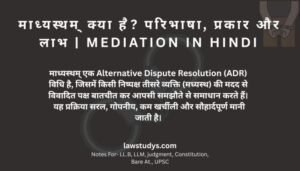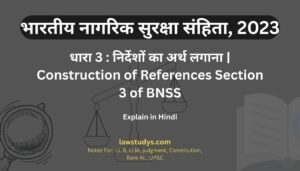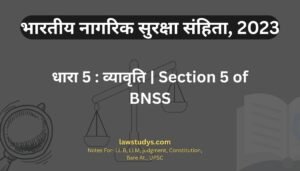Delegated legislation plays an important role in the Indian law and comes under administrative law. This article describes what is delegated legislation under administrative law, its definition and the factors that contributed to the development of delegated legislation in India.
If you are a lawyer, law student or preparing for judicial competitive examination, Then it is very important for you to know about Delegated Legislation.
Delegated Legislation
Delegated legislation is an important concept of law making. In fact, the main work of law-making is that of the legislature. This work of law-making cannot in principle be entrusted to any other body or person.
But ever since the trend of Welfare State has been promoted, there has been an unprecedented increase in the law-making work of the legislature.
At present time the legislature does not have enough time to formulate all the statutes, bye-laws, rules, regulations etc. on its own. For this reason, it largely creates laws that incorporate principles and policies and leaves the rest of the work to the executive or administrative officers, which work is called ‘delegated legislation’.
Delegated legislation is also called Subordinate Legislation, Administrative Legislation or Skeleton Legislation.
Pro. According to Wade and Phillips – In the present times, due to the extensive work of administration and increase in the work of the state in the social and economic fields, it has become necessary for the Parliament to hand over the work of making regulated instruments to the ministers.
Also Read – What is Social Action Litigation in India & Essential conditions
Definition
It is difficult to give a universal definition of Delegated Legislation, because the definition of Delegated Legislation can be seen in two senses – one in the sense of the definition of delegation and the other in the sense of the definition of Delegated Legislation.
Definition of Delegation
Handing over of any power by one body to another body is called delegation, in this the residual powers i.e. powers of revocation and amendment remain reserved with the delegatee only.
In the case of Indira Nehru Gandhi vs. Rajnarayan (1976), it has been said by the Supreme Court that, delegation means handing over the right to exercise the powers vested in a person or body of persons to another person or body of persons in such a way that revocation Or the full powers to make amendments remain with the delegate or grantor.
Definition of Delegated Legislation
Delegated legislation is the delegation of legislative powers to the executive by the legislatures. In simple words, it can be said that handing over legislative functions to the executive by the legislature under certain constraints is delegated legislation. It has been accepted in two meanings –
(i) When the legislature hands over its legislative functions to the executive, then it is called delegated legislation, and
(ii) When rules, regulations, orders, instructions etc. are issued by the executive under the law-making work assigned to it, then it is also called delegated legislation.
Thus, delegated legislation is legislation which is made by a body other than the legislature. Generally, the substantive laws under this are made by the legislature but the task of implementing such laws is left to the executive which makes rules, regulations etc.
Read Also – What do you understand by juvenile delinquency? Its causes and treatment
Limits of Delegated Legislation
Since the beginning, the question has been raised whether the legislature can delegate its legislative powers to the executive or is there any limit to it, in this regard the case of Delhi Lodge Act, 1912 is a famous and guiding case.
In this case, some important principles regarding the limits of delegated legislation were enunciated by the Supreme Court, such as –
(i) Delegation of law-making cannot be done beyond a prescribed limit.
(ii) Necessary legislative powers cannot be delegated.
(iii) Necessary legislative functions cannot be abandoned or surrendered by the legislature.
(iv) Among the essential legislative functions, at least the determination of legislative policy and its structure must be binding on conduct.
(v) The power of delegation is inconsistent with the legislative power.
In the case of Delhi Laws Act (A.I.R. 1951 SC 322), the Supreme Court was of the opinion that there is a limit to delegation and legislative powers cannot be delegated beyond that limit.
If there is excessive delegation of legislative powers, it can be declared unconstitutional by the court.
In this regard, the important case of Hamdard Dawakhana vs. Union of India (A.I.R. 1960 SC 554) is worth noting.
Delegated Legislation in India
The powers of the Parliament and the State Legislatures have been mentioned in Articles 245 and 246 of the Constitution of India, but there is nothing in these two articles from which it can be concluded that legislative powers cannot be delegated by the legislature.
There are many provisions in the Constitution which provide legislative powers to the executive, such as –
(i) Ordinance can be issued by the President when the Parliament is not in session.
(ii) Similarly, when the state legislature is not in session, an ordinance can be issued by the Governor, and
(iii) Law-making work is done by the executive during emergency.
These provisions were kept in the Constitution because delegated legislation was considered necessary by the framers of our Constitution.
From the above discussion it is clear that delegation of legislative powers can be done by the legislature up to a certain limit.
Read Also –
Further, such functions cannot be delegated by the Legislature, which –
(i) is of essential nature
(ii) It is related to policy making
(iii) is related to material matters, and
(iv) Are not going to surrender or abandon legislative powers.
Elements of Development of Delegated Legislation
The credit for the emergence and development of delegated legislation in India goes to its form of welfare state. When the nature of the state was not for public welfare, then the legislature did not have much work and it used to make laws on all its subjects.
But as its functions as a public welfare state increased, the burden of law-making also increased on it and thus, Delegated Legislation was born.
There have been many reasons for the emergence and development of delegated legislation in India or it can be said that many supporting elements have been involved in its development, the main elements of which are as follows –
(i) lack of time
In the modern perspective, the functions of Parliament have increased tremendously. Parliament not only has the task of making laws but it also has to consider many national and international problems.
Besides, the work of regulation and control of increasing political activities also has to be done by the Parliament. In such a situation, very little time is left for Parliament to make laws.
For this reason, substantive laws are made by the Parliament and the task of making supplementary laws, bye-laws, rules, regulations etc. for the implementation of those laws is handed over to the executive.
This makes it clear that due to lack of time at the Parliament’s disposal, delegated legislation has got the opportunity to flourish and blossom.
(ii) Technicality of content
The latter half of the twentieth century and the beginning of the twenty-first century have been full of specialties. Today, there has been unprecedented progress in the field of knowledge and science.
The world is making progress in technologies like space, nuclear power, energy, computers, telecommunication etc. In such a situation, the need for methods to regulate them also began to be felt.
It is not necessary for Parliament to make appropriate laws on all these subjects. It is also not mandatory to have experts on all subjects available in the Parliament.
In such a situation, the task of making laws on such technical and technology related matters is left to the executive. The legislature decides the policy on such subjects and leaves the rest to the administration.
Ultimately they are discussed and deliberated upon by the Parliament. Thus, technicality of subjects has been the second reason for the development of delegated legislation.
(iii) Resilience
Only that method is considered good which is suitable for the times and which has the ability to change according to the country, time and circumstances.
Just as life is changeable, similarly methods should also be changeable. (Like life, law is not static). This is the reason why it becomes necessary to make changes, amendments etc. in the laws from time to time.
This process of change and amendment can be easily used in delegated legislation, that is, it is easy to amend rules, regulations etc. whereas it is very difficult to make repeated amendments and changes in substantive laws.
(iv) Emergency Situation
Delegated legislation has also proved useful in dealing with emergencies and contingencies. Sometimes quick action is required to deal with sudden emergencies.
Such emergency can take any form like war, external attack, famine, flood, drought, infectious disease, earthquake, economic crisis etc.
To face these emergency situations, legislation etc. has to be made under prompt action. Many important decisions have to be taken and they also have to be kept confidential.
Parliament is not a suitable place for all this and at times Parliament is not even in session at such times. In such a situation, administrative decisions under delegated legislation prove to be very important.
The Defense of the Realms Act, 1914 and the Emergency Powers Act, 1920 passed during the First and Second World Wars have proved to be quite meaningful. In India, the Defense of India Act, 1971 is an important example of this.
These are such legislations under which extensive powers have been delegated to the executive. Thus, the state of emergency is also considered to have an exemplary contribution in the development of delegated legislation.
(v) Local and Regional Topics
For making laws on local and regional issues and problems, such persons and bodies are required who are well acquainted with these issues and problems and along with this, consultation of interested persons is also required.
This work can be accomplished well only by the administration. Under the substantive law passed by the legislature, powers to make rules, regulations etc. are delegated to the executive or administration to deal with such issues and problems.
(vi) Conducting Experimental Works
There are certain provisions in certain Acts which have to be implemented on a particular date in a particular place or area. Their expiry date is determined according to their usefulness. This work is generally left to the government and administration.
It is the government and administration that decides which provisions are to be implemented in which areas and when. Thus, this system also increases the use and importance of delegated legislation. We can consider this as a reason for the development of delegated legislation.
(vii) Discretionary Subject
Many government and administrative tasks are of such a nature that discretion is required in their execution. Generally, public utility services are of this nature.
It is easy for the government and administration to make and issue laws, bye-laws, rules, regulations etc. on such subjects. This also encouraged the trend of delegated legislation.
In the case of Ramesh vs. Union of India (A.I.R. 1990 S.C. 56), it has been said by the court that, the development of delegated legislation was actually due to socio-economic needs because to fulfill these, the legislature used wide and Failed to make detailed legislation.
Now the situation is that the legislature generally incorporates the socio-economic provisions in the legislation and hands over the work of making necessary rules etc. to implement them to the administration.
In this way it can be said that, delegated legislation has become an indispensability for the present times and without it, in a way, legislature is incomplete.
Related Posts
What is the Schools of Criminology And how many Types are there? – Criminology
Doctrine of res gestae | Facts forming part of the same transaction | Sec. 6 Evidence
Ideology of Criminology and its different types | Criminology Notes
Note – If there is a need for modification in the post, please share and subscribe to the blog.
Reference – Book Administrative Law (Dr. Ganga Sahay Sharma)





